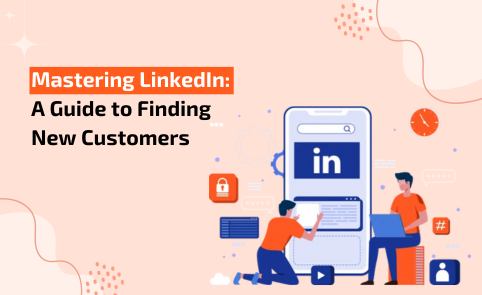In today's digital age, social media platforms have become vital tools
for
businesses seeking to expand their reach and connect with potential customers. Among these
platforms, LinkedIn stands out as a premier platform for professional networking and
lead generation.
With its extensive user base of professionals and businesses, LinkedIn
offers unparalleled opportunities to find new customers and grow your
business.
In this comprehensive guide, we'll delve into the basics of LinkedIn
and
outline the first five essential steps to leveraging the platform effectively to
find
new customers.
Understanding
LinkedIn: The Basics
LinkedIn is the world's largest professional networking
platform, boasting over 700 million users worldwide.
Launched in 2003, LinkedIn's primary focus is on fostering
professional connections, job searching, and industry-specific discussions.
Unlike other social media platforms, LinkedIn is tailored specifically
for
professionals, making it an ideal platform for businesses looking to engage with a
professional
audience.
It is used by companies above all to generate new
leads ,
i.e. new contacts potentially interested in their products/services.
LinkedIn, in fact, is the most suitable social network for B2B lead
generation.
This is because it is a channel where a company can detail its
position in the market and show itself as an industry leader.
What are the
peculiarities of this platform?
First of all, LinkedIn, unlike Instagram, Facebook and Twitter, being
a
professional social media allows you to interact directly with possible "warm contacts",
i.e.
those who have already developed a certain interest in your company.
This allows you to increase your contact database
much
more easily.
If you are new to this social media you are probably wondering
where to start.
The First 5 Steps to
Finding New Customers on LinkedIn
1. Optimise Your Company Profile
Your LinkedIn company page serves as your business's digital
storefront.
It's essential to create a compelling company profile that showcases your
brand, products, and services.
Ensure your profile is complete, including relevant information about
your
business, such as your mission, values, and offerings.
To help potential clients find you on LinkedIn, make sure to include
keywords and industry words in your description.
2. Create Compelling Content
Once the profile is complete you can move on to the contents.
Content is king on LinkedIn. Share valuable and
relevant
content that resonates with your target audience.
This can include industry insights, thought leadership articles, case
studies, and company updates.
By providing valuable content, you establish credibility and attract
potential customers to your brand..
It will be easier to gain new connections and followers
if you always tell something interesting and relevant to your audience.
The ideal is to publish content based on a niche strategy , such as
guides
and tutorials, PDFs, texts with images or videos, which always refer to a
call-to-action in order to collect new contacts..
3. Engage with Your Audience
Building relationships is key on LinkedIn. Actively
engage with your audience by responding to comments, messages, and connection requests
promptly.
As you start sharing content regularly, don't forget about previously
published posts and the people who commented on them.
The sense of belonging to a group, a community made up of people with
common interests is very important.The ideal is to respond to all the people who write to
you
and interact with your audience as much as possible .Your community, however, should be
real, as
should your online reputation.
Don't try to overdo it and send invitations to users who are not
related
to your industry and without an introductory message, just to get the first connections.
Our advice is to write a simple invitation but with attention to
detail ,
which explains in short lines who you are and what your company does.
4. Leverage Your Employees
Your profile and that of your employees are the soul of your
brand.
Encourage them to update their profiles with accurate company
information
and share company updates and content with their networks. Employee advocacy can
significantly
amplify your brand's reach and visibility on LinkedIn.
You can also use LinkedIn as a recruiting tool, creating job
advertisements to insert in the "Work" section.
5. Explore Paid Advertising
If you start using LinkedIn consistently, there will probably come a
time
when you will ask yourself whether it is worth investing in advertising on
this
platform.
The answer is yes.
Although the cost of ads on LinkedIn is higher than
that
of Instagram and Facebook, in this case it is not simply a question of obtaining likes and
followers of the page, but real contacts who could potentially become your customers.
We recommend creating engaging text for your ads, adding a thoughtful
image, and linking to a page on your website where you can collect data.
LinkedIn offers a range of advertising options to help businesses
reach
their target audience effectively. From sponsored content to targeted ads, paid advertising
on
LinkedIn can help you increase brand awareness, generate leads, and drive conversions.
Experiment with different ad formats and targeting options to find
what
works best for your business.
Conclusion
LinkedIn offers unparalleled opportunities for businesses to find new
customers and grow their brand presence. By optimising your company profile, creating
compelling
content, engaging with your audience, leveraging your employees, and exploring paid
advertising
options, you can effectively attract and convert leads on LinkedIn. Incorporate these five
steps
into your LinkedIn strategy to unlock the platform's full potential and take your business
to
new heights.
For more details connect us on : contact@techysquad.com |
digital@techysquad.com
